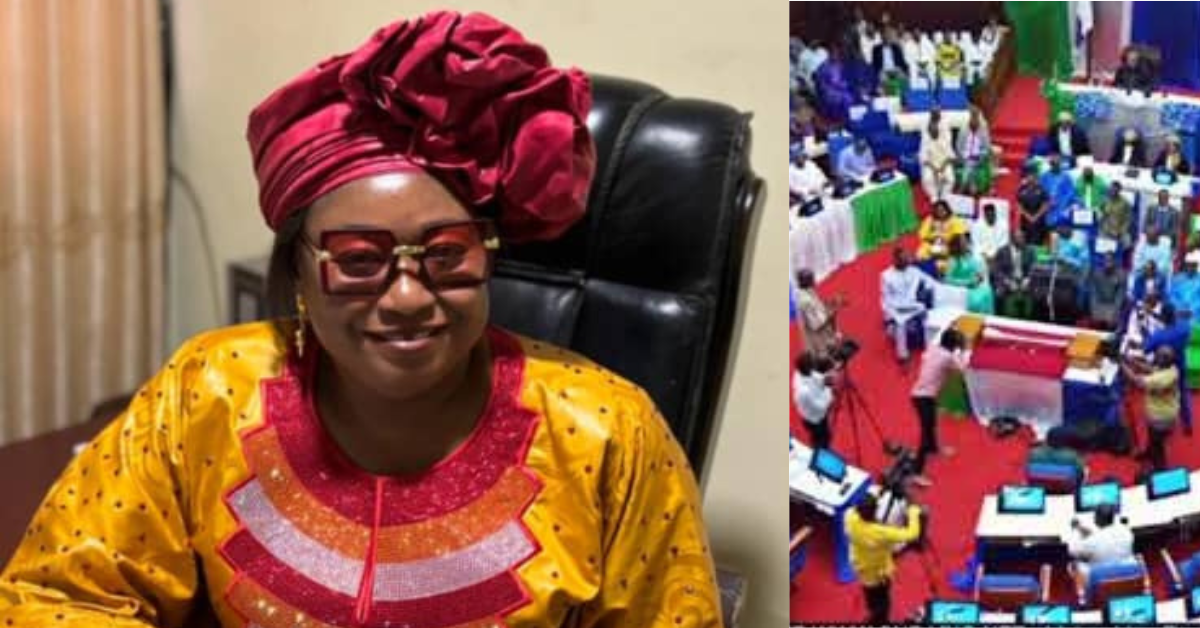On the brisk morning of Tuesday, November 26, 2024, the Parliament of Sierra Leone buzzed with an unmistakable air of anticipation. At the heart of this charged atmosphere stood Hon. Memunatu Jalloh, representing the resilient people of Port Loko District.
Her eloquent address during the deliberations on the 2025 national budget transcended rhetoric, striking a chord with representatives and citizens alike as she illuminated some of the most critical challenges facing Sierra Leone.
Hon. Jalloh’s speech, a mix of commendation, critique, and urgent calls for reform, painted a vivid picture of the nation’s socio-economic struggles and the path forward. With a tone that balanced optimism with sober realism, she wove together a narrative that underscored both progress and the pressing need for change.
Championing Women Entrepreneurs
Hon. Jalloh began by extending heartfelt appreciation to the Ministry of Finance for its progressive allocation of 50% of SME resources to women-owned businesses. She lauded this step as a watershed moment for the economic empowerment of women, a demographic that forms the backbone of Sierra Leone’s informal economy.
Acknowledging the invaluable contributions of women to national development, Hon. Jalloh emphasized that initiatives like these are not merely economic decisions but moral imperatives. However, her gratitude was tempered by a candid critique of systemic barriers that continue to hinder women’s progress.
The issue of collateral emerged as a focal point in her address. She described how the lack of access to collateral stymies women’s ability to secure loans, impeding their entrepreneurial ambitions. Her call to the Ministry of Finance to dismantle these barriers was clear and forceful: equity must not remain an aspiration—it must be a reality.
Exposing Predatory Practices
In a move that brought solemnity to the chamber, Hon. Jalloh turned her attention to a pernicious issue plaguing rural communities: the exploitation of women by predatory microcredit institutions. These institutions, she explained, impose exorbitant interest rates, trapping vulnerable women in cycles of debt.
With evocative language, she painted a heartbreaking picture of women abandoning their homes and families, their lives upended by financial despair. This vicious cycle, she argued, ripples through society, leaving children exposed to crime, exploitation, and a bleak future.
Her poignant question echoed across the chamber: “Is this the life Sierra Leoneans deserve?” It was a direct challenge to the government’s policy effectiveness and its commitment to uplifting its citizens.
Food Security: A National Imperative
Shifting to the pressing issue of food security, Hon. Jalloh addressed a sobering statistic: Sierra Leone ranks as the second poorest country in food security globally, according to the IMF. She called this a “national disgrace” for a country rich in potential yet grappling with hunger and malnutrition.
Hon. Jalloh urged her colleagues to reflect on a time when Sierra Leone, under the APC government led by Dr. Ernest Bai Koroma, achieved a higher ranking on the food security index. “What went wrong?” she asked, challenging both the government and citizens to confront the causes of this regression.
While she acknowledged the promise of the Feed Salone initiative, Hon. Jalloh urged vigilance in its implementation. Transparency and accountability, she asserted, are non-negotiable if the initiative is to fulfill its goal of enhancing agricultural productivity and securing the nation’s food supply.
“Food security,” she reminded the House, “is not just an economic issue. It is the cornerstone of dignity, health, and hope.”
A Call for Transformative Leadership
As her address drew to a close, Hon. Jalloh’s voice resonated with a call for transformative leadership. She appealed to her fellow representatives and the government to prioritize policies that uplift the nation’s most vulnerable—especially women and children, who disproportionately bear the brunt of Sierra Leone’s challenges.
Her speech was not merely a critique but a roadmap, emphasizing the need for inclusive growth, systemic reforms, and a government willing to act decisively for its people.
A Legacy of Advocacy
Hon. Memunatu Jalloh’s stirring address serves as a testament to the power of advocacy rooted in truth and compassion. It is a reminder of the pressing need for leadership that listens, learns, and acts with integrity.
Her words have ignited a flame of accountability, urging Sierra Leoneans to envision and demand a brighter future—one where equity, food security, and dignity are not privileges but guarantees for every citizen.











